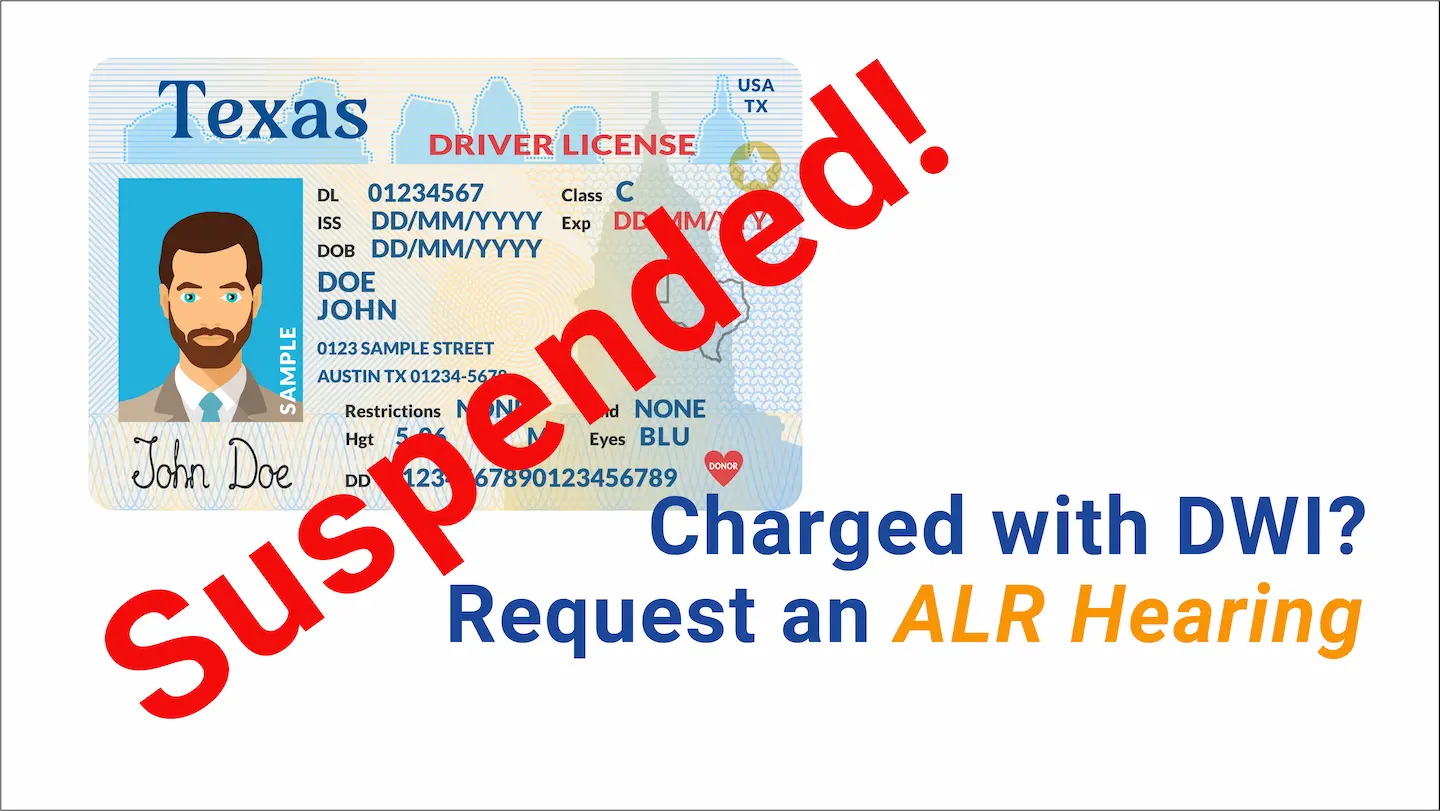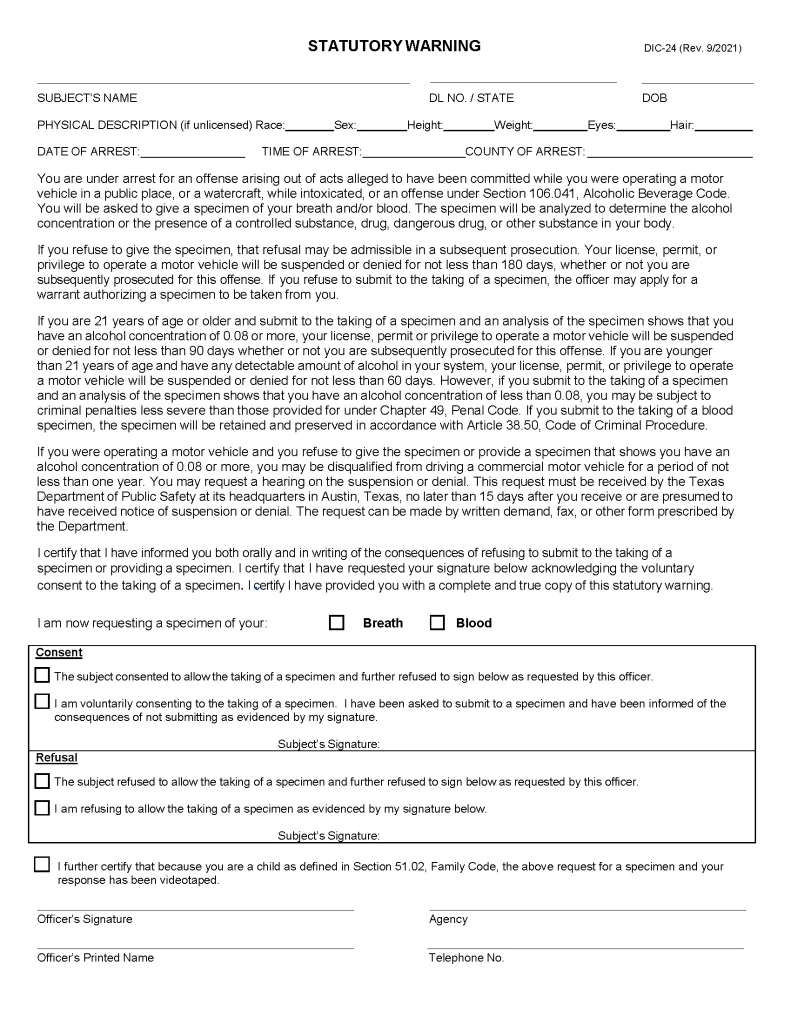
What Does ALR Mean?
ALR stands for Administrative License Revocation. The Administrative License Revocation is a civil legal matter where the Texas Department of Public Safety (“DPS”) attempts to suspend a person’s driver’s license for a variety of reasons. Chapters 524 and 724 of the Texas Transportation Code authorize the DPS to suspend a person’s driver’s license in the context of a DWI arrest. Depending on the circumstances, ALR suspensions typically range from 90 days to 2 years, although ALR suspension durations differ for under 21 alcohol-related violations.
What Triggers an ALR Suspension?
When a police officer places someone under arrest on suspicion of Driving While Intoxicated (“DWI”), Texas law requires the officer to provide the arrested person with the Statutory Warning:

The Statutory Warning provides a DWI arrestee with notice of the consequences for consenting to provide a blood or breath specimen for alcohol testing if the alcohol concentration turns out to be greater than or equal to 0.08 or for refusing to provide a specimen of breath or blood for alcohol testing. If the DWI arrestee refuses to provide a specimen of breath or blood, the DPS will issue the ALR suspension of the arrestee’s driver’s license 40 days from the offense date. If the arrestee consents to provide a specimen of breath or blood and that specimen registers a BAC >= 0.08, the DPS will order the ALR suspension 40 days after mailing the arrestee a notice of suspension.
What is an ALR Hearing?
Requesting an ALR Hearing delays an ALR suspension and provides the person accused of Driving While Intoxicated an opportunity to fight their driver’s license suspension. If the person arrested for DWI either refuses to provide a specimen of breath or blood or provides a breath specimen >= 0.08, the arrestee will have 15 days, including their arrest date, to request an ALR hearing.
When the person charged with DWI consents to provide a blood specimen, the police agency submits the blood specimen to a DPS-accredited forensic laboratory. Once the DPS receives the lab report, it will mail a notice of suspension to the arrestee if the arrestee’s alcohol concentration is >= 0.08. The arrestee will have 20 days to request a hearing from the date listed in the notice of suspension. If the arrestee fails to request a hearing, the ALR suspension will become effective 40 days after the date listed on the notice of suspension.
How Do I Request an ALR Hearing?
The moment a client hires us to defend them for Driving While Intoxicated charges, we fax requests for an ALR Hearing and ALR Discovery to the DPS. To be safe, regardless whether a prospective client consented or refused to provide a blood or breath specimen, we recommend requesting an ALR Hearing within two weeks of the offense date. If the person arrested for DWI has not hired an attorney before the deadline to request an ALR Hearing, the arrestee can request a hearing through the DPS website by clicking here.
How Do ALR Hearings Work?
When a person charged with DWI hires us before their ALR hearing, the first thing we do is request the hearing and discovery. Discovery is another word for evidence. ALR Discovery contains a copy of the arresting officer’s offense report, the statutory warning provided to the arrestee, and if the arrested person consented to provide a blood or breath specimen, ALR Discovery will contain a lab report or breath test slip.
We review ALR Discovery to determine which officer we need to subpoena to testify at the ALR Hearing. Properly serving the arresting officer with a subpoena plays a critical role in preparing for the ALR Hearing. Texas Administrative Code section 159.211(c)(2) provides that the DPS cannot admit evidence in their ALR case when a properly served officer fails to appear at the ALR Hearing. When that happens, the DPS is forced to dismiss their ALR case, resulting in no ALR driver’s license suspension.
ALR Hearings take place over Zoom. If the properly-served officer appears at the ALR Hearing, our attorneys cross examine the officer on the record. We not only endeavor to win the ALR Hearing, but we also attempt to gather sworn recorded testimony from the officer that may strategically benefit out clients in the DWI criminal matter. Arrestees who have hired attorneys do not need to appear for the ALR Hearing. On the other hand, arrestees representing themselves must appear at the hearing, and the ALR judge will expect these arrestees to follow the same procedures as the attorneys.
What Happens After the ALR Hearing?
ALR judges do not make their ruling at the conclusion of the ALR Hearing. Typically, we receive the ALR judge’s ruling within a couple of weeks from the hearing. If the judge makes a negative finding, then no ALR suspension takes place. If the judge makes an affirmative finding, the ALR suspension becomes effective the date the judge issues his or her ruling. It is an offense to operate a motor vehicle with an active ALR suspension, so our next step is to obtain an Occupational Drivers License (“ODL”). For more information about ODLs, check out our blog on that topic.
Accused of Driving While Intoxicated?
Let our experienced DWI criminal defense attorneys fight for you! Schedule your DWI consultation today.


